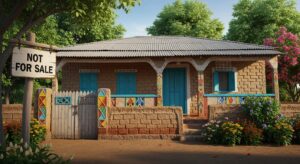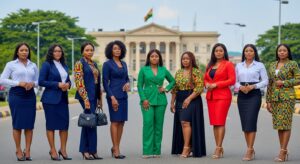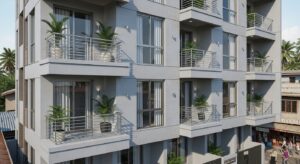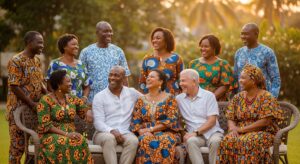Whether you’re a local buyer or a member of the African diaspora investing from abroad, understanding the difference between leasehold and freehold land ownership in Ghana is crucial. These two terms define how long you can legally own land or property — and what rights and responsibilities come with it.
In Ghana’s evolving property market, clarity on this topic can protect you from future legal disputes, unexpected costs, and even loss of property rights.
This article breaks down everything you need to know about leasehold vs freehold in Ghana, with factual insights and data-backed analysis for smart investors.
1. What Is Leasehold in Ghana?
A leasehold is a contractual agreement in which the buyer gains the right to occupy and use land or property for a fixed period of time. In Ghana:
- Leasehold agreements for non-citizens (foreigners) are capped at 50 years, renewable.
- Ghanaian citizens can receive leaseholds for up to 99 years.
- At the end of the lease period, ownership reverts back to the lessor (usually the original landowner, stool, family, or government).
The leaseholder typically pays a ground rent, which may be annual or lump sum, and must comply with conditions laid out in the lease agreement (e.g., residential or commercial use, development timelines, etc.).
📌 Note: More than 70% of land transactions in Ghana are leasehold arrangements — particularly in urban areas like Accra, Kumasi, and Takoradi.
2. What Is Freehold in Ghana?
A freehold interest means the buyer has absolute ownership of the land or property, with no expiration date. The two main types are:
- Customary Freehold: Granted by traditional authorities or stools to members of their community, often passed down through inheritance.
- Common Law Freehold: Rare and mostly historical, involving private individuals or institutions with outright ownership recognized under Ghanaian law.
However, since Ghana’s 1992 Constitution, freehold grants by stools or families to non-family members have been heavily restricted or abolished. As such, true freehold titles are uncommon — especially for foreigners or diaspora investors.
3. Can the Diaspora or Foreigners Own Freehold Land in Ghana?
In short: No.
The 1992 Constitution of Ghana expressly prohibits non-citizens from owning freehold interests in land. Instead, foreigners — including diaspora investors without full Ghanaian citizenship — are limited to leasehold rights for a maximum of 50 years.
✍🏽 Article 266 (1) of the 1992 Constitution: “No interest in, or right over, any land in Ghana shall be created which vests in a person who is not a citizen of Ghana a freehold interest in any land in Ghana.”
Even dual citizens are often encouraged to process transactions under leasehold terms unless they can prove they’re acquiring land through inheritance or family lineage.
4. Key Differences: Leasehold vs Freehold
| Feature | Leasehold | Freehold |
|---|---|---|
| Ownership Duration | Fixed term (50–99 years) | Permanent / unlimited |
| Ownership Type | Right to occupy/use land | Absolute ownership |
| Applicable To | Citizens and foreigners | Citizens only (rare for diaspora) |
| Renewable? | Yes, subject to agreement | Not applicable |
| Ground Rent | Often required | Rarely applicable |
| Control & Restrictions | Subject to lease terms | Owner has full control |
| Transferability | Can assign remaining lease period | Can transfer, bequeath, or sell freely |
5. Why Leasehold Is Still a Smart Option for Diaspora Investors
While the idea of “owning land forever” is emotionally appealing, leasehold options — when done right — offer security, legal clarity, and long-term value.
✅ Leaseholds are:
- Legally protected under Ghana’s land tenure system.
- Renewable (many leaseholds are renewed without issue if proper documentation and development have occurred).
- Recognized internationally, with leasehold systems used in the UK, India, and parts of the U.S.
- More flexible for those investing in real estate developments, short-term rentals, or future resale.
In fact, most real estate developers in Ghana sell leasehold apartments or houses — even within gated communities and luxury developments.
6. Legal Safeguards for Leasehold Buyers
To ensure your leasehold investment is secure:
- Conduct a title search at the Lands Commission.
- Work with a licensed surveyor and lawyer.
- Ensure your indenture is stamped and registered.
- Clarify lease conditions: development deadlines, transfer rights, rent reviews, and renewal clauses.
- Keep records of all receipts and contracts.
7. The Bigger Picture: Why Clarity Matters in Ghana’s Land Market
Land disputes are one of the leading causes of litigation in Ghana’s courts. According to the Judicial Service of Ghana, over 50% of civil cases in regional courts are land-related, often due to:
- Multiple sales of the same plot
- Undefined boundaries
- Oral agreements without documentation
Understanding leasehold vs freehold is not just legal trivia — it’s a necessary step to protect your capital and peace of mind.
Final Thoughts
In Ghana’s complex land environment, freehold is rare, regulated, and out of reach for most diaspora investors. Leasehold, while time-bound, offers a safe, practical, and respected way to acquire property.
Whether you’re building a retirement home, securing land for future development, or investing in rental property, the key is not whether it’s freehold — it’s whether it’s verified, registered, and legally secure.
Looking to Buy Property in Ghana? Let DPN Global Guide You.
We specialize in helping diaspora investors access vetted leasehold properties, navigate Ghana’s land tenure system, and avoid costly pitfalls.







